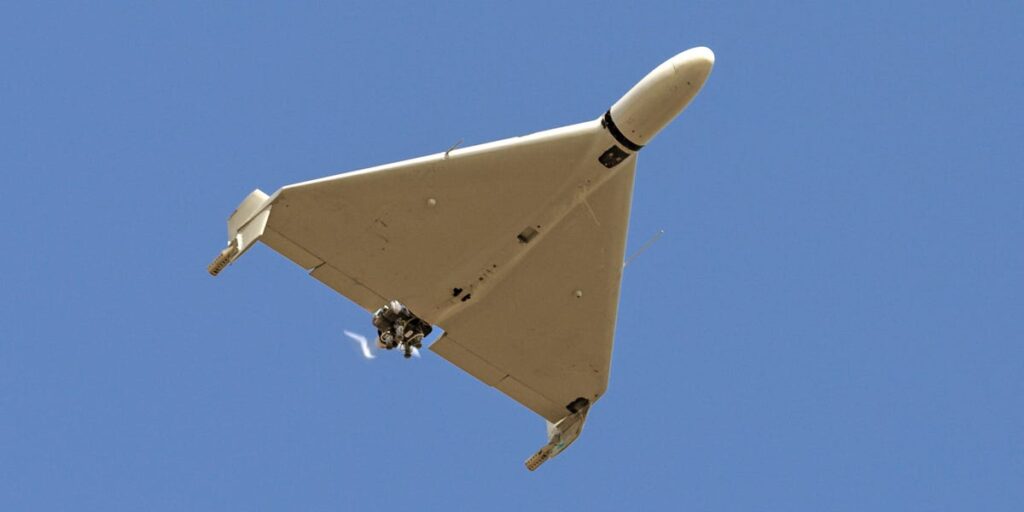Russia is tapping China to build long-range attack drones for use in its war against Ukraine, Reuters reported.
The report stated that Russia had created a secret weapons program in China, citing documents as well as two unnamed sources from a European intelligence agency.
Experts on the region told Business Insider that although such a partnership has not been publicly reported before, it’s plausible and should have been expected.
In Reuters’ reporting, IEMZ Kupol, a subsidiary of Russia’s state-owned arms company Almaz-Antey, has developed and tested a long-range attack drone model called the Garpiya-3, or G3, in China.
Citing reports sent by Kupol to the Russian Ministry of Defence earlier this year, Reuters said that the drones were developed with the help of local specialists in China.
It said that another Kupol report had said that G3s and other drones could be produced at the Chinese factory at scale for the war in Ukraine.
The outlet also wrote that it had seen invoices confirming that Kupol had received seven military drones made at the facility in China to its headquarters in the Russian city of Izhevsk.
Two of these were G3 models, it said.
The G3 can travel about 1,200 miles with a payload of 110 pounds, Reuters wrote, citing the Kupol reports.
Furthermore, the Kupol reports said that within eight months, the Chinese factory would be able to produce another drone with a payload of 400kg, per Reuters.
This would be comparable to a US Reaper drone, European intelligence officials told the outlet.
China’s foreign ministry told Reuters it was unaware of such a project.
Business Insider has not independently verified the Reuters report. However, two experts told BI that it is plausible.
“It is absolutely a likelihood — almost a near certainty — that the cooperation between Russia and China at the military and technical level is deeper than is commonly reported,” said James Nixey, director of the Russia and Eurasia program at London’s Chatham House think tank.
The West “shouldn’t be surprised” at the newly reported closer cooperation, he added.
China claims to be neutral in the war with Ukraine. But its partnership with Russia is growing — including aiding Russia’s sanctions-hit economy by buying vast amounts of oil, and partnering in showy joint military exercises.
But prior to the Reuters report, it was thought that China stopped short of transferring entire weapons systems to Russia.
Nixey said it’s a matter of increments.
The US had long accused China of supporting Russia’s war effort by supplying dual-use components that could be used in the manufacture of weapons, and, Nixey said, it would be “naive” to assume they are not.
On September 11, US Deputy Secretary of State Kurt Campbell accused China of straight-up supplying military parts.
The new report will make it “increasingly difficult” for the West to ignore the ways that China is aiding Russia during the war, Sari Arho Havrén, an associate fellow specializing in China’s foreign relations at the Royal United Services Institute, told BI.
“I think we are moving towards a situation where this simply cannot be ignored anymore,” she said.
Officially, the EU’s position is to impose sanctions on countries that provide military aid to Russia, she said. But Brussels has been unwilling to do that to China.
Sanctions are “absolutely China’s fear,” Nixey said.
If that happens, “then China’s well-oiled machine, there’s suddenly grit in it because secondary sanctions will prevent China from interacting with a global economy, which it must do if it is to continue growing,” he continued.
Even so, China’s motivations for working so closely with Russia are clear, he said.
While the two countries do not have identical worldviews, Russia’s war in Ukraine provides a significant challenge to Western readiness and influence, something that China finds extremely useful.
“Let’s be absolutely clear about it: China does not want Russia to lose this war,” Nixey said. “That would not be in China’s interests.”
The war, he said, “is a symbol and a forebear of Western ability, Western spine, Western political will to defend the rules-based international order.”
The West has reacted with alarm to the latest news.
NATO’s spokesperson, Farah Dakhlallah, told Reuters: “These reports are deeply concerning and Allies are consulting on this matter.”
“The Chinese government has a responsibility to ensure its companies are not providing lethal assistance to Russia,” Dakhlallah added. “China cannot continue to fuel the largest conflict in Europe since the Second World War without this impacting its interests and reputation.”
However, according to Nixey, the West should have also done far more.
“We should have been planning for this way before,” he said. “We shouldn’t be hoping it doesn’t happen. That’s insane.”


